人教版九年级英语教案
九年级英语教案及反思全一册人教版
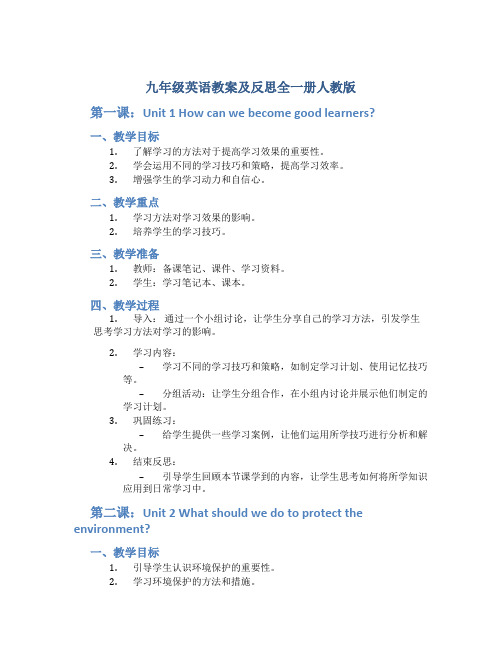
九年级英语教案及反思全一册人教版第一课:Unit 1 How can we become good learners?一、教学目标1.了解学习的方法对于提高学习效果的重要性。
2.学会运用不同的学习技巧和策略,提高学习效率。
3.增强学生的学习动力和自信心。
二、教学重点1.学习方法对学习效果的影响。
2.培养学生的学习技巧。
三、教学准备1.教师:备课笔记、课件、学习资料。
2.学生:学习笔记本、课本。
四、教学过程1.导入:通过一个小组讨论,让学生分享自己的学习方法,引发学生思考学习方法对学习的影响。
2.学习内容:–学习不同的学习技巧和策略,如制定学习计划、使用记忆技巧等。
–分组活动:让学生分组合作,在小组内讨论并展示他们制定的学习计划。
3.巩固练习:–给学生提供一些学习案例,让他们运用所学技巧进行分析和解决。
4.结束反思:–引导学生回顾本节课学到的内容,让学生思考如何将所学知识应用到日常学习中。
第二课:Unit 2 What should we do to protect the environment?一、教学目标1.引导学生认识环境保护的重要性。
2.学习环境保护的方法和措施。
3.激发学生爱护环境的意识。
二、教学重点1.环境保护的重要性。
2.环境保护的具体措施和方法。
三、教学准备1.教师:备课笔记、PPT、环保素材。
2.学生:学习笔记本、环保手册。
四、教学过程1.导入:通过一个视频或图片展示,引发学生思考环境污染对人类生活的影响。
2.学习内容:–学习环境保护的相关知识,了解环境污染的来源和危害。
–分组讨论:让学生分组探讨如何保护环境并提出解决方案。
3.实践活动:–组织学生参加环境保护实践活动,如垃圾分类、植树等,让学生亲身体验环保行动的重要性。
4.总结反思:–引导学生总结本节课学到的环保知识,让学生思考日常生活中如何做出环保实践。
总结与展望本节课通过引导学生探讨学习方法和环境保护,旨在培养学生的学习能力和环保意识,帮助他们成为全面发展的人才。
人教版九年级英语全册教案

人教版九年级英语全册教案教案标题:人教版九年级英语全册教案教案目标:1. 通过本教案的学习,学生将能够掌握九年级英语全册所涵盖的语法、词汇和听说读写技能。
2. 培养学生的英语学习兴趣,提高他们的自主学习能力和合作学习能力。
3. 培养学生的跨文化交际意识,增强他们的跨文化交流能力。
教学重点:1. 掌握九年级英语全册的语法知识和词汇量。
2. 提高学生的听说读写能力。
3. 培养学生的跨文化交际意识。
教学难点:1. 帮助学生理解和运用九年级英语全册的语法知识。
2. 提高学生的听力和口语表达能力。
3. 培养学生的跨文化交际能力。
教学准备:1. 九年级英语全册教材和教学辅助资料。
2. 多媒体设备和相关课件。
3. 学生课本和练习册。
教学过程:Unit 1: Hello!Lesson 1: Greetings and IntroductionsStep 1: Warm-up- 通过展示与问答的形式,复习和引入与问候和介绍相关的词汇和表达方式。
Step 2: Presentation- 使用多媒体设备和图片,展示不同国家的问候方式和介绍习惯,引发学生的兴趣和好奇心。
Step 3: Practice- 学生分组进行角色扮演,模拟不同场景下的问候和介绍情景,并通过互动练习加深对语言的理解和运用能力。
Step 4: Consolidation- 向学生介绍并解释本课时的重点词汇和语法知识,帮助他们理解和掌握。
Step 5: Extension- 提供一些额外的练习和活动,以巩固学生对本课时所学内容的掌握,并扩展他们的思维和表达能力。
Step 6: Homework- 布置相关的课后作业,包括练习册上的题目和口头作业,以巩固学生对本课时所学内容的掌握。
教学评价:1. 教师通过观察学生在课堂上的表现和参与度,评价他们对本课时所学内容的理解和掌握程度。
2. 学生完成的课后作业和口头作业,以及课堂上的小组活动和角色扮演,也可作为评价学生学习情况的依据。
人教版九年级英语教案

人教版九年级英语教案一、教学目标。
1. 语言知识目标。
- 学生能够掌握本单元的重点单词,如“influence”“require”“silent”等,并能准确发音、拼写和运用。
- 理解并熟练运用重点短语和句型,如“be influenced by”“require sb. to do sth.”等。
2. 语言技能目标。
- 听力方面,能听懂有关人物性格变化及其原因的对话和短文。
- 口语方面,能够用英语流利地描述人物的性格特点以及这些特点形成的原因。
- 阅读方面,能读懂关于个人成长和性格发展的文章,掌握文章的主要内容和细节信息,并能根据文章进行简单的推理。
- 写作方面,能够根据所给话题,写出一篇关于人物性格变化的短文,内容完整,语言表达准确。
3. 情感态度目标。
- 让学生意识到成长过程中各种因素对性格的影响,鼓励学生积极面对生活中的变化,培养积极向上的人生态度。
4. 文化意识目标。
- 了解不同文化背景下人们性格形成的差异,拓宽国际视野。
二、教学重难点。
1. 教学重点。
- 重点单词、短语和句型的学习与运用。
- 掌握描述人物性格变化的表达方式。
2. 教学难点。
- 如何引导学生理解并运用较复杂的句子结构,如含有定语从句的句子来描述人物性格变化的原因。
- 让学生在口语和写作中准确地表达自己的观点,并使内容富有逻辑性。
三、教学方法。
1. 情景教学法。
通过创设各种与生活实际相关的情景,让学生在真实的语境中学习和运用英语。
例如,创设一个同学聚会的情景,让学生描述多年不见的同学性格上的变化。
2. 任务驱动法。
布置各种任务,如小组讨论、角色扮演、短文写作等,让学生在完成任务的过程中提高语言综合运用能力。
3. 交际教学法。
鼓励学生之间、学生与教师之间进行英语交流,培养学生的口语表达能力和交际能力。
四、教学过程。
(一)导入(5分钟)1. 老师走进教室,脸上带着神秘的笑容,然后说:“Hey, guys! Today we are going to embark on an interesting journey about how people change. You know, just like a caterpillar turns into a beautiful butterfly. Let's first lookat some pictures.”(展示一些名人小时候和长大后的对比照片,如周杰伦、哈利·波特扮演者丹尼尔·雷德克里夫等)2. 接着问学生:“Can you see any differences in their looks? And what about their personalities? Do you think they have changed?”引导学生简单讨论并分享自己的看法。
人教版九年级上册英语教案(优秀5篇)
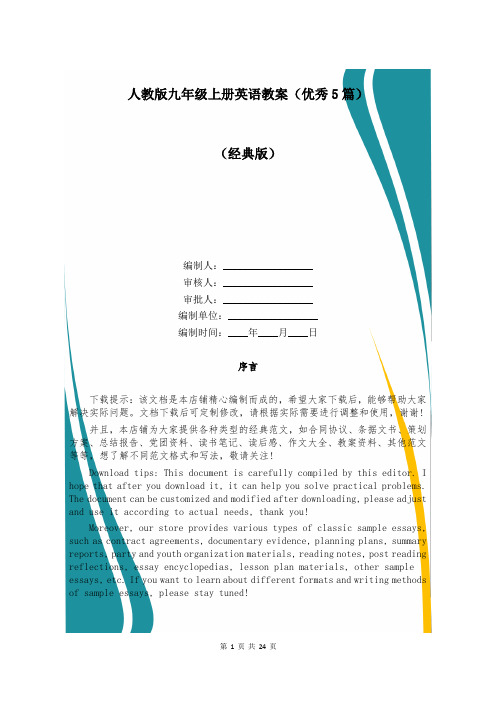
人教版九年级上册英语教案(优秀5篇)(经典版)编制人:__________________审核人:__________________审批人:__________________编制单位:__________________编制时间:____年____月____日序言下载提示:该文档是本店铺精心编制而成的,希望大家下载后,能够帮助大家解决实际问题。
文档下载后可定制修改,请根据实际需要进行调整和使用,谢谢!并且,本店铺为大家提供各种类型的经典范文,如合同协议、条据文书、策划方案、总结报告、党团资料、读书笔记、读后感、作文大全、教案资料、其他范文等等,想了解不同范文格式和写法,敬请关注!Download tips: This document is carefully compiled by this editor. I hope that after you download it, it can help you solve practical problems. The document can be customized and modified after downloading, please adjust and use it according to actual needs, thank you!Moreover, our store provides various types of classic sample essays, such as contract agreements, documentary evidence, planning plans, summary reports, party and youth organization materials, reading notes, post reading reflections, essay encyclopedias, lesson plan materials, other sample essays, etc. If you want to learn about different formats and writing methods of sample essays, please stay tuned!人教版九年级上册英语教案(优秀5篇)九年级是整个初中阶段的重要一年,因此教师需要学习先进的教育理念,认真准备每一次教案。
新人教版九年级英语上册全册教案
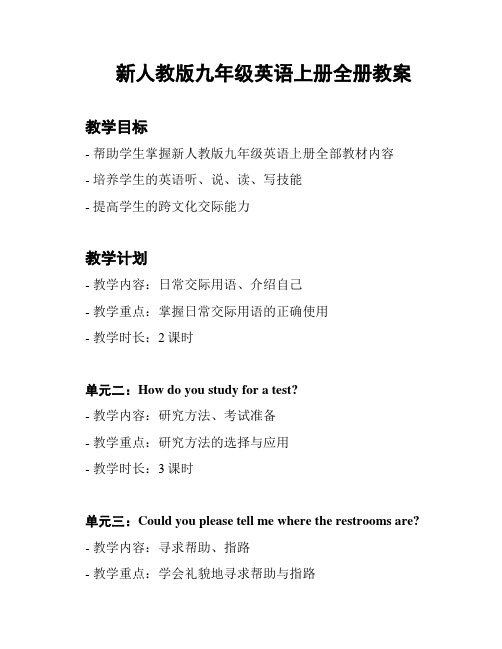
新人教版九年级英语上册全册教案教学目标- 帮助学生掌握新人教版九年级英语上册全部教材内容- 培养学生的英语听、说、读、写技能- 提高学生的跨文化交际能力教学计划- 教学内容:日常交际用语、介绍自己- 教学重点:掌握日常交际用语的正确使用- 教学时长:2课时单元二:How do you study for a test?- 教学内容:研究方法、考试准备- 教学重点:研究方法的选择与应用- 教学时长:3课时单元三:Could you please tell me where the restrooms are? - 教学内容:寻求帮助、指路- 教学重点:学会礼貌地寻求帮助与指路- 教学时长:2课时单元四:I used to be afraid of the dark.- 教学内容:过去的经历和惯- 教学重点:掌握过去式的使用- 教学时长:2课时单元五:What are the benefits of going green?- 教学内容:环境保护、可持续发展- 教学重点:理解环境保护的重要性- 教学时长:3课时单元六:I love music that I can dance to.- 教学内容:音乐、电影与艺术- 教学重点:学会表达自己对音乐、电影和艺术的喜好和感受- 教学时长:2课时单元七:Teenagers should be allowed to choose their own clothes.- 教学内容:青少年的权利与责任- 教学重点:理解和讨论青少年应有的权利与责任- 教学时长:3课时单元八:Reading for pleasure- 教学内容:阅读和写作- 教学重点:培养学生的阅读兴趣和写作能力- 教学时长:4课时单元九:Wildlife protection- 教学内容:野生动物保护- 教学重点:了解野生动物保护的重要性,并表达自己的看法- 教学时长:2课时单元十:Musical instruments- 教学内容:乐器与音乐- 教学重点:了解各种乐器和音乐类型,并能进行简单的介绍- 教学时长:3课时教学评价- 结合课堂表现、作业成绩、测试等多种评价方式进行评价- 通过个人表现、小组合作等方式培养学生的主动研究能力- 鼓励学生参与课堂互动,提高口语表达能力参考资料- 教材:新人教版九年级英语上册- 辅助教材:听力材料、课外阅读材料等。
最新 人教版九年级 英语上册全册教案
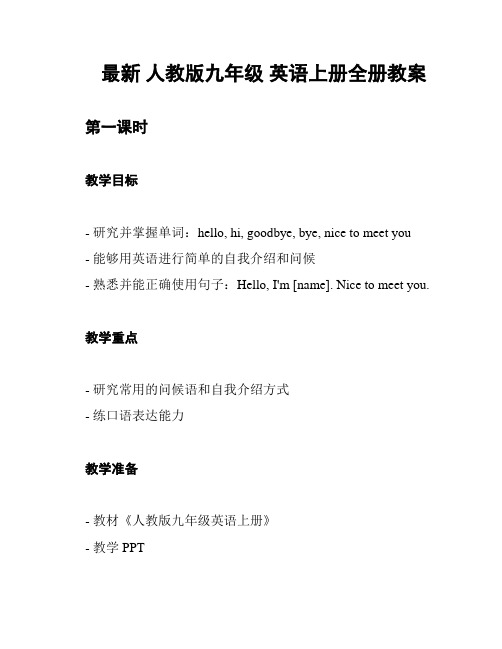
最新人教版九年级英语上册全册教案第一课时
教学目标
- 研究并掌握单词:hello, hi, goodbye, bye, nice to meet you
- 能够用英语进行简单的自我介绍和问候
- 熟悉并能正确使用句子:Hello, I'm [name]. Nice to meet you. 教学重点
- 研究常用的问候语和自我介绍方式
- 练口语表达能力
教学准备
- 教材《人教版九年级英语上册》
- 教学PPT
教学步骤
1. 导入新课,向学生简要介绍本节课的内容,并激发学生研究
的兴趣。
2. 分发教材,让学生跟读单词:hello, hi, goodbye, bye, nice to meet you。
3. 解释单词的意思,帮助学生掌握词汇。
4. 利用示范和展示图片等方式,让学生理解并掌握句子:Hello, I'm [name]. Nice to meet you.
5. 引导学生进行口语练,让他们用所学内容进行自我介绍和问候。
6. 收集学生的口语表达,进行点评和纠正。
7. 结束本节课,作简单复,并布置下节课的预内容。
教学延伸
- 练更多的问候语和自我介绍方式,丰富学生的口语表达能力。
- 制作小组或角色扮演活动,让学生在真实情境中运用所学内容。
教学评价
- 观察学生的参与程度和口语表达能力,及时给予鼓励和指导。
- 收集学生的口头回答、书面练习,进行评估和改进教学策略。
人教版九年级英语教案

人教版九年级英语教案篇1:人教版经典英语教案《I'm in New York now》Teaching objectives:1. Words: arrive taxi flat building made again2. Sentences:Grandma made Chinese food for me.I want to try American food.I will write again soon.3. Practise to pronounce ‘wh’ ‘wr’.4. Learn the song: It’s a big exciting world.Teaching properties: cards tape-recorder picturesTeaching proceduresWarmer:1. Stick the pictures of unit 1 on the board. Have the students e to the front and mime the text of unit 1.2. Say a sentence in the present tense and get the students say it in the past tense.Examples:T: Daming goes to New York.Ss: Daming went to New York.T: Grandma meets Daming.Ss: Gradma met Daming.Teach the text:1. Raise the picture of the Statue of Liberty and ask: What is it ? Where is it?”Guide the students say: It’s the statue of Liberty. It’s in New York”.T: Daming is in New York now. Let’s see who met him at the airport. What he saw in New York and What food he wanted to eat.2. Play the tape. Have the students listen and underline the new words in books.3. Teach the new words.4. Play the tape again. Have the students listen and say. After this, get the students to answer the following questions:⑴Who met Daming at the airport? (Grandma and Simon)⑵What did Daming see in New York? (Buildings, cards and people)⑶What food did he want to try? (American food)5. Complete activity 2 in SB. (Get the students to ask and answer in pairs)6. Practise to pronounce 'wh' 'wr'.7. Learn the song: It’s a big exciting world.8. Complete exercise 1 in AB.Homework:Practise the following sentences in pairs:Where are you from?Where are you going to go?Where are you going to go there?Where are you going to do there?Designs:Module 10 Unit 2 I’m in New York nowArrive Grandma mad Chinese food for me.TaxiFlat I want to try American food.buildingmade I will write again soon篇2:九年级英语教案九年级英语教案Unit 8 I’ll help clean up the city parks.课时安排四课时第一课时:Section A 1a―2c 第二课时:Section A 3a―4 第三课时: Section B 1a---2c 第四课时:Section B 3a―4 教学目标:1、会表达提供帮助; 2、会正确使用常用动词短语; 3、谈论自己喜欢并愿意从事的志愿者工作。
人教版九年级上册英语教案5篇
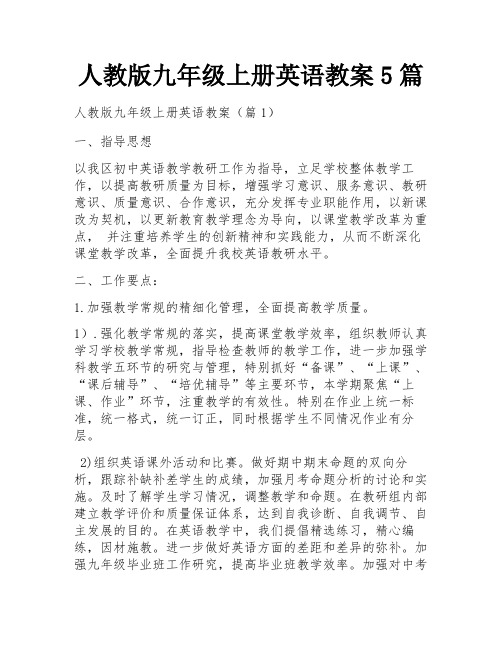
人教版九年级上册英语教案5篇人教版九年级上册英语教案(篇1)一、指导思想以我区初中英语教学教研工作为指导,立足学校整体教学工作,以提高教研质量为目标,增强学习意识、服务意识、教研意识、质量意识、合作意识,充分发挥专业职能作用,以新课改为契机,以更新教育教学理念为导向,以课堂教学改革为重点,并注重培养学生的创新精神和实践能力,从而不断深化课堂教学改革,全面提升我校英语教研水平。
二、工作要点:1.加强教学常规的精细化管理,全面提高教学质量。
1).强化教学常规的落实,提高课堂教学效率,组织教师认真学习学校教学常规,指导检查教师的教学工作,进一步加强学科教学五环节的研究与管理,特别抓好“备课”、“上课”、“课后辅导”、“培优辅导”等主要环节,本学期聚焦“上课、作业”环节,注重教学的有效性。
特别在作业上统一标准,统一格式,统一订正,同时根据学生不同情况作业有分层。
2)组织英语课外活动和比赛。
做好期中期末命题的双向分析,跟踪补缺补差学生的成绩,加强月考命题分析的讨论和实施。
及时了解学生学习情况,调整教学和命题。
在教研组内部建立教学评价和质量保证体系,达到自我诊断、自我调节、自主发展的目的。
在英语教学中,我们提倡精选练习,精心编练,因材施教。
进一步做好英语方面的差距和差异的弥补。
加强九年级毕业班工作研究,提高毕业班教学效率。
加强对中考走势的信息收集和测试研究,集中精力,争取在九年级中考中取得一个满意的成绩。
2.?以教科研引领,为教师的专业化成长打造新的平台。
1).大力开展校本教研,拓宽教师课程视野,逐渐成为学习型、反思型教师。
通过同伴互动。
充分发挥学校骨干教师、优秀教师的作用,通过“共享式的集体备课”、“探究式的课堂实践活动”和“专题式的学习讨论活动”等促进教师之间的互动,营造“集体备课、资源共享、个人加减、教后反思”的教研氛围。
结合优质课堂活动,并且推出一节具有代表性的研讨课。
(陈美红老师开课)2).根据各年级特点,进行一次主题教研活动。
- 1、下载文档前请自行甄别文档内容的完整性,平台不提供额外的编辑、内容补充、找答案等附加服务。
- 2、"仅部分预览"的文档,不可在线预览部分如存在完整性等问题,可反馈申请退款(可完整预览的文档不适用该条件!)。
- 3、如文档侵犯您的权益,请联系客服反馈,我们会尽快为您处理(人工客服工作时间:9:00-18:30)。
Unit12 You are supposed to shake hands.重点短语词组应该做某事be to do sth 握手访问by 毕竟本应该做但没做have done 餐桌礼仪table到达at/in 有点晚late习惯于某事be/get to sth 习惯于做某事be/get sth 被用于做某事be sth 被用作.... Be过去常常做某事sth 特地,不怕麻烦的做某事使某人感到宾至如归计划做某事sth没有理由have 注意你的行为your manners发出噪音make (a) 做鬼脸make自学....by oneself 在适当的时间at the time 以......开始begin 忍不住做某事can't sth代替of 对某事随意be sth邀请某人做某事sb sth 指向重点短语句型讲解:1. Y ou should have asked what you were supposed to wear.你本应该问清楚怎么样穿才得体。
中的“should have asked”是“情态动词+现在完成时”表示过去本应该做某事,事实上没有做,这是虚拟语气的一种表达方式。
如:She should have gone to Beijing. 她本应该去了北京。
(没有去)同时was/were supposed to do sth 表示过去本该做某事而实际上并没有做,就相当于should have done sth.2. make (some) mistakes 犯了(一些)错误。
make a mistake 犯错误(一个)与mistake相关的短语by mistake 错误地mistake…for…把..误认为…5.relaxed:用来形容人,表示人本身很放松,主语一般是人。
relaxing:指物,表示事物可使人很放松。
I feel really after the vacation.经过这次令人放松的假期后我感到很放松。
3. …it’s okay if you arrive a bit late….即使你晚到一会也没关系。
a little 与a bit 二者都是“有点儿”的意思。
(1)二者相同之处在于①都可做状语,修饰比较级He is a bit/ a little older than you.②都可做主语或宾语。
Please give me a bit/ a little.(2)不同之处在于:两者修饰名词时,a little可以直接加名词,a bit必须加of后才能接名词。
A little money = a bit of money4. drop by 顺便拜访串门We just dropped by our friends’homes.我们刚刚去朋友家串门。
drop in/on sb 顺便走访某人。
Would you drop in/on us this evening for a chat?你今晚过来和我们聊聊好吗?5. invite sb. to do sth. 邀请某人做某事如:Lily invited me to have dinner.莉莉请我吃晚饭。
6. without .prep.没有. 其后常接名词、代词和动词ing形式。
Jim今天早上没吃早饭就去学校了。
7. around the world == all over the world 全世界8.at the table 在饭桌旁at table 在吃饭类似的短语还有:in hospital by sea 由海路in future从今以后in the hospital by the sea在海岸上in the future在将来9.pick up sth 捡起挑选如:He picked up his hat. 他捡起他的帽子。
如果宾语是代词需置于pick与up之间pick it up10. start doing == start to do 开始做某事如He started reading.== He started to read. 他开始读。
11. point at 指着at是介词,后跟动作的目标。
女孩正指着墙上的地图。
point to 指向to是介词,后跟动作的方向。
当point做及物动词讲时,常用于point sth at sth 用…指着You shouldn’t point your finger at anyone.你不应该用手指任何人。
12. stick v. 剌截stick…into….把…插入…别把叉子插入食物中。
n. 棒,棍请递给我那根棍子。
chopsticks 筷子是由chop(砍)+stick(棒)合成,通常用复数形式:chopsticks13. be different from 与…不同Chinese food is different from theirs. 中国菜与他们的不同.be different in…在…方面不同这两件毛衣在颜色上不一样。
14.I find it difficult to remember everything. 我发现要记住每一样事是困难的。
形式宾语真正宾语常见的形式宾语有:find / think + it/them +形容词to do sth. 如:I think it hard to study English.15.Everying was unfamiliar.一切都是那样的陌生。
Be familiar/unfamiliar to sb 为某人所熟悉/不熟悉That face is unfamiliar to me.Be familiar/unfamiliar with sth 对某物熟悉/生疏I’m unfamiliar with that face.16. And I had not just one set to use, but two or three of each.Not…but…不是…而是…,用来连接连个并列成分。
他们不是需要钱,而是需要时间。
Not…but…连接两个主语时,谓语动词遵循就近原则。
不是黎明而是黎明的父母去了长城。
17. Was I supposed to begin with the largest ones or the smallest?Begin with 以…开始第二课以一首歌开始。
n, beginning from the beginning 自始,从一开始at the beginning of …在…的开始(初)from beginning to end 至始至终at the beginning of December at the beginning of Winter18.E-mail English is a new kind of written English that is being used to save time.电子邮件英语是一种新型的用来节省时间的书面英语。
(1)that is being used…是一个定语从句,修饰前面的written English. 定语从句用的是现在进行时的被动语态,that在定语从句中做主语,不能省略。
(2)written English 书面英语spoken English 英语口语written 与spoken 是过去分词形式,均表被动关系,充当形容词,做前置定语。
(3)在英语中表示“被动关系”的有两种形式,一种是过去分词做定语,一种是被动语态。
The novels written by Lu Xun are very educational.鲁迅写的小说很具有教育意义。
The novels are written by Lu Xun.这些小说史鲁迅写的。
英语中表示“正在进行”的有两种形式,一种是现在分词做定语/宾补,一种是进行时态。
I found a wallet lying on the ground. (做宾补)The girl singing the song is my younger sister. (做定语)19.This is because they come from a computer program called ICQ, which means I seek you.20. can’t stop doing 忍不住做某事=can’t help doing sth.I can’t stop laughing. 我忍不住笑.当听到这个消息,我忍不住哭了。
21…..it’s created by combining letters and symbols or numbers to sound like other words….(1)be created by 由……组成,by是介词,后接名词、代词或动名词作宾语。
(2) combine .v. (使) 结合,混合combine…and…将…和…混合起来combine…with…将…与…合并Combine “tele”with “communication”, we’ll get a new word “telecom”.22.Do these two on your own…独自做这两道题….On one’s own 独自的,主动的,自愿的。
在句中做状语。
他现在自食其力。
Of one’s own 属于某人自己的,of前常接名词或不定代词。
We have no house of our own.With one’s own 用某人自己的,own后接名词。
Remember to do everything with your own ideas. 记着用你自己的想法去做事情。
23. cut up 切开切碎如:Let’s cut up the water melon. 让我们切开这个西瓜吧。
make faces做鬼脸face to face 面对面练习题Section A一、选词填空(用wear , put on, dress的适当形式填空)1. It’s very cold outside, ________ your coat.2. The girl who ________ in light blue is my sister.3. Many girls ________ shirts in summer time.4. Sally’s sister is old enough to ________ herself.5. “Could you ________ the children for me ?” she asked her husband.6. She ________ a new sweater today.7. Lily ________a flower in her hair yesterday.8. He ________ his glass to read the letter.二、单项选择( )1. They _____ a football match if it _____ fine next Thursday afternoon.A. will have; will beB. have; will beC. will have; is( )2.----Shall I ask Lillian to see the film with us?---- I don’t think she will. She _____ it twice. A. saw B. has seen C. sees( )3.Qingdao is one of the best places for _____ in China. A. surfing B.surf C. surfs( )4. We _____ shake hands when we meet someone for the first time.A. supposeB. suppose ofC. are supposed to( )5. Li Ying told me _____ for her at home. A. waits B. wait C. to wait( )6. I _____ my homework already. A. finish B. have finished C. finished( )7. ---- If you _____ a new idea, please call me as soon as possible.---- Sure, I will. A. keep up with B. catch up with C. come up with ( )8.Most of the girls in our class enjoy _____ music.A. listening B. listen to C. listening to( )9. Ted ten dollars on the shirt yesterday. A. cost B. spent C. paid( )10. I want to know whether . A. will he give back the bookB. he gives back the bookC. he will give back the book( )11.They some plans for the coming summer vacation.A. have madeB. has madeC. makes( )12. Lily planed her uncle the next day. A. to visit B. visiting C. visit( )13. Do you know Mr Green come to China? A. when B. what C.where( )14. --- Would you like something to drink? ---- .A. No, thanks.B. Yes.C. Not at all.( )15. Do you know a sports meeting next Friday?A. what there will to beB. if there is going to beC. there was going to have( )16. Who can help me do the work? A. other B. else C. another( )17. ---- May I speak to Li Hua, please?----I’m afraid he isn’t in. Would y ou like to a message? A. take B. write C. leave ( )18. ---- Do you want a pear of an orange? --- . I really don’t mind.A. NeitherB. EitherC. Both( )19. ---Excuse me, I want to know . ---I parked it behind this building.A. where did you park my carB. where you parked my carC. how you parked my car( )20. I can’t say I want to visit my grandpa. It’s a long time since we met last time.A. how oftenB. how longC. how soon D how much( )21. Thanks for me with my English. A. help B. helping C. helped( )22. He the phone and began to dial the number.A. pick upB. picks upC. picked up( )23. The hand of the clock is pointing eleven o’cl ock. A. to B. at C.out( )24. I’m really thirsty. I’ll stop.A. to take a drink B. taking a drink C. take a drink ( )25. Don’t. Your father is sleeping. A. turn off the TV B. make any noise C. be quiet ( )26. Nothing can make him his goals. A. to give up B. give in C. give up( )27. ---- were you away from home last year?---- About one month. A. How often B. How far C. How long( )28. He didn’t understand yesterday.A. what the teacher says.B. what the teacher saidC. what did the teacher say ( )29. Could you tell me ? A. how long the Fujiang River was B. how long was the Fujiang River C. how long the Fujiang River isD. how long is the Fujiang River ( )30. Traveling by train is cheaper and enjoyable than by air.A. more; much moreB. quite; much tooC. very; very muchD. much; far more( )31. It’s rude you to speak loudly in public. A. of B. for C. to( )32. The room was of smoke. A. full B. fill C. filled( )33. good information he has got! A. What a B. What C. How a( )34. clever boy he is ! A. What B. What a C. How a ( )35. Could you please help me cut these potatoes? A. up B. off C. down( )36. A good idea occur him. A. to B. at C. for( )37. It was eleven o’clock when he arrived Paris. A. in B. at C. to( )38. My grandpa is used to a walk in the morning. A. have B. has C. having ( )39. Great changes in my hometown.A. have been taken placeB. have taken placeC. has taken place( )40. --- Bob is late for school. ----Neither am I .A. always B. never C. ever. ( )41. The problem is we should do at first. A. that B. what C. which( )42. Mr Gereen has got used to with chopsticks. A. eat B. ate C. eating( )43. The girl is making plans her little brother with his lessons.A. helpsB. to helpC. helping( )44. What you to do before going to bed?A. did; supposeB. are ; supposingC. are ; supposed( )45. Without a word, he left home. A. says B. say C. saying( )46. The street is people on Sunday. A. crowded with B. crowd with C. crowd ( )47. Bob, there is a book on the floor, please .A. pick it up B. pick up it C. picks it up ( )48. Xiao Lin is a good students, he behaves .A. well B. good C. badly( )49. The town we visited a few years ago is much larger than before.A. itB. whoC. which( )50. --- You will go swimming this Saturday, won’t you?--- . I have to work this Saturday. A. Yes, I will B. Yes, I won’t C. No, I won’t三、完成句子1. There’s only (一点儿,少许)milk left, could you get some on your way home?2. Do you (握手)with each other when you meet someone for the first time?3. I (拜访)the writer on my way home yesterday.4. Though he (犯了一些错误), he is still a good boy.5. He said, “Miss Li, I’m sorry for (迟到).”6. I had a stomachache because of (错吃了食物).7.You (本应该完成家庭作业) yesterday but you didn’t’8. They (计划)take a vacation next week.9. The students are (制订计划) for the new term.10. ---- How’s everything? ---- .(还不错)11. He smiled, (毕竟) he succeeded at last.12. I don’t think English is (难得多) than Chinese.13. They (特地)to see me every month.14. You (本应该到达)here at 8 o’clock, but you’re late.15. The little girl (擦去)off the tears and laughed.16. 除最后一个问题没答外,其余问题他都答了。
